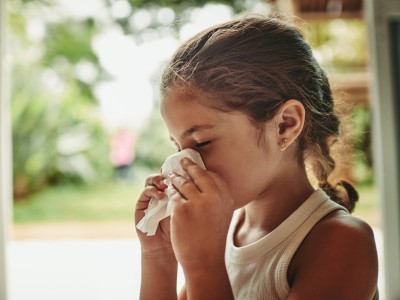We provide unparalleled care for children with allergic disorders, including asthma, food allergy, eosinophilic esophagitis, hay fever and eczema. Our allergists and immunologists can perform specific tests that may help determine your child's allergies and, for those with frequent infections, whether the immune system is functioning properly.
Phoenix Children's Allergy & Immunology Clinic provides care for children with allergic diseases and disorders, including asthma, food allergy, “hay fever” and eczema. The clinic is affiliated with the Pediatric Pulmonology Department, thus allowing access to the Pediatric Respiratory Lab and its on-site respiratory testing. Allergy “skin testing” is performed in the Allergy Clinic for diagnosing seasonal and perennial allergies, food allergies, stinging insect allergies and drug allergies. For food and/or drug challenges, the clinic offers excellent supervision with emergency access when needed to the Hospital’s code team.
For children with recurrent illnesses, the clinic offers comprehensive immune evaluations and can help determine your child’s frequent infections are due to primary immunodeficiency, uncontrolled allergies, anatomical abnormality or another reason.
Preparing for Your Visit
Depending on your child’s symptoms and after consulting with the medical provider, your child may undergo same-day testing during the Allergy & Immunology Clinic visit. Be prepared for the visit to last from one to four hours in order to complete the necessary testing. There are certain medications that interfere with the testing, and it is very important that your child stop taking the medication(s) before the appointment.
If your child is unable to stop taking one of the medication(s) or if you have any questions, please contact the clinic at 602-933-4063.
Please note: Inhalers do not need to be stopped.
Five (5) Days Before Your Visit
If your child is taking any of the following allergy medications (in pill or liquid form, nasal spray, or eye drops), please stop five (5) days before the visit:
- Azelastine nasal spray (Astepro, Astelin, Dymista)
- Cetirizine (Zyrtec)
- Desloratadine (Clarinex)
- Diphenhydramine (Benadryl)
- Fexofenadine (Allegra)
- Hydroxyzine (Atarax)
- Ketotifen eye drops (Zaditor, Alaway)
- Levocetirizine (Xyzal)
- Loratadine (Claritin, Alavert)
- Olopatadine eye drops (Pataday, Patanol, Pazeo)
- Olopatadine nasal spray (Patanase)
Seven (7) Days Before Your Visit
If your child is taking the following allergy medication, please stop seven (7) days before the visit:
- Doxepin
Ten (10) Days Before Your Visit
If your child is taking the following allergy medication, please stop ten (10) days before the visit:
- Cyproheptadine (Periactin)
Also, many over-the-counter cold, cough, flu medications and sleep aids contain sedating antihistamines. If your child is taking any of these medications, please stop them within this timeframe as well.
Frequently Asked Questions
Your allergist/immunologist will start by determining what type of illnesses/infections your child has had. This may include the type of microorganisms, severity of infections and response to treatments. From there, various testing may be indicated to determine if the frequent infections are due to primary immunodeficiency, uncontrolled allergies, anatomical abnormality or other reasons.
The diagnosis of asthma is established by a combination of clinical history and pulmonary function testing (if your child is old enough). This test is a common component of visits in the Allergy/Immunology Clinic and is administered by respiratory therapists who work closely with your child’s healthcare provider.
Your allergist/immunologist can determine if your child has a food allergy by obtaining a detailed medical history and, if indicated, performing allergy testing. The gold standard for the diagnosis food allergy is an oral food challenge. This is available in the Allergy/Immunology Clinic, but may not be necessary for diagnosis.
Allergy testing assesses for the presence of immunoglobulin type E, or IgE. This test can be done by skin testing or a specialized blood test. Your allergist/immunologist will determine if this test is necessary and which method is best for your child.
Part of a clinic visit for food allergy includes extensive education. You will be informed of the prognosis for your child’s food allergy, specifically whether it is likely to be outgrown or not. You will also be given information regarding treatment, avoidance measures, how to read a food label and much more.
Treatment for food allergy consists predominately of avoidance at this time. For EoE, treatment can include elimination diets, medication and, in some cases, elemental diet.
Allergy shots are designed to gradually expose you to things in the environment you are allergic to (for example, dogs, dust mites or pollen). This is down slowly over time in order to induce tolerance to the allergens. This treatment option is available for conditions like asthma, allergic rhinitis (“hay fever”) and atopic dermatitis (eczema). These shots are usually given in the arms.
Allergy “shots” must be given frequently in the beginning (1 to 3 times per week). This is called the “build-up” phase. Once this phase is complete, shots are given monthly during the “maintenance phase.” It is generally recommended that allergy shots be continued once per month at the maintenance dose for 3 to 5 years. This may be different for venom shots.
Eczema is caused by a combination of genetics and the environment. Once present, various triggers can cause a “flare.” During your clinic visit, your allergist/immunologist will determine if this testing is necessary.
Flares of eczema are not commonly caused by food allergens, though they can be. The Allergist/Immunologist will assess the severity of your child’s eczema, treatments tried, response to treatment and much more in order to determine if food allergy testing is indicated.
Despite what many think, there is no such thing as a hypoallergenic dog or cat. This is in part due to the fact that the allergenic proteins come from the animal's hair, saliva and even the skin!
While penicillin allergy is very common, it is also very common to outgrow it! Allergy testing and drug challenge is routinely done in the Allergy/Immunology Clinic to determine if a child has “outgrown” his or her penicillin allergy.
Locations


Phoenix Children's Specialty Care - Arrowhead Campus
6524 W. Sack Dr.
Glendale, AZ 85308

Phoenix Children's Specialty Care - Avondale Campus
1665 N. Avondale Blvd.
Avondale, AZ 85392



